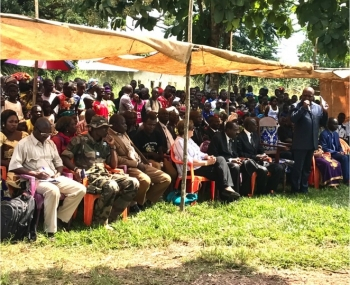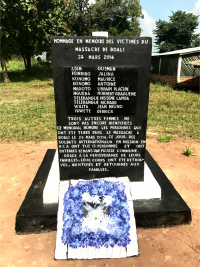Major step forward for justice as experts exhume and investigate mass grave in the Central African Republic
Grave contained bodies of victims allegedly killed in 2014 by international peacekeepers
NEW YORK, December 12, 2017 – Victims were identified and their remains returned to families last month, at the conclusion of a landmark forensic investigation of alleged war crimes by peacekeepers in the Central African Republic. Experts from the Columbia Law School Human Rights Clinic and the Argentine Forensic Anthropology Team assisted Central African authorities to investigate allegations that peacekeepers massacred civilians, including women and children, in 2014, and tried to hide the bodies in a mass grave.

“Now it is the responsibility of the government to take next steps to follow and bring justice for those who are responsible for this massacre,” said the families of those allegedly killed, in a statement delivered at a November 20 public ceremony. “If we did not have this possibility to see and receive back the bones of our relatives, how would it have been possible for us to have peace?”
At the ceremony, held in Boali where the mass grave was discovered, the experts handed over a forensics report to the investigating judge, and the victims’ remains were returned to the families. The families also unveiled a memorial, which they had created to commemorate their relatives.
“Our country has gone through a serious crisis, but the country is determined. We are convinced that without justice, there cannot be peace in the Central African Republic,” said Flavien Mbata, the Minister of Justice and Human Rights, who attended the ceremony, and spoke on behalf of the President of the country, Faustin-Archange Touadéra. “Today, we are making a big contribution to truth and justice.”

The Minister attended the ceremony alongside the Boali mayor, senior members of the judiciary and police forces, as well as academia, NGOs, the press, and representatives from the U.S. embassy.
“Forensic anthropology can play a valuable role in uncovering the truth and providing justice in CAR,” said Dr. Luis Fondebrider, President of the Argentine Forensic Anthropology Team and an internationally renowned forensics expert, who has carried out mass grave and forensic investigations in over 35 countries. “We worked closely alongside national actors, including police and medical and law students from the University of Bangui, to incorporate practical training into the process.”
The experts were appointed by a CAR investigating judge in 2016, and carried out the exhumation, investigation, and analysis through 2017. The investigation involved exhuming various sites, conducting detailed interviews with families, and DNA analysis. The case was made more complicated because the original mass grave had been exhumed in early 2016 without any expert input, risking damage to evidence and comingling remains.
“Ensuring that the work, and the manner in which it was carried it out, prioritized the human rights of families was vital,” said Professor Sarah Knuckey, Director of the Columbia Law School Human Rights Clinic. “For families, a transparent scientific process that leads to identification and information about what occurred can facilitate proper burial, and support grieving processes, memorialization, and dignity.”
The Boali investigation is part of broader work undertaken by the Human Rights Clinic and EAAF in the Central African Republic. The groups work closely with government officials, academia, and civil society to increase access to training and experiential learning about investigating alleged killings. The groups, working with the University of Bangui’s Center for Human Rights and Democratic Governance, have offered trainings for CAR actors as well as the Special Criminal Court in CAR. The Human Rights Clinic has also supported NGOs in the country to access trainings on investigations and advocacy related to human rights in the context of the armed conflict.

“It has been incredible working within a multidisciplinary and multinational team and to gain so much practical experience in investigating human rights violations committed during conflicts,” said clinic student Marryum Kahloon LLM ’18, a current Fulbright Scholar and Australian lawyer who seeks a career in human rights. “This has been a formative experience that has emphasized the importance of working very closely with rights holders, and I look forward to continuing our work in CAR next year.”
